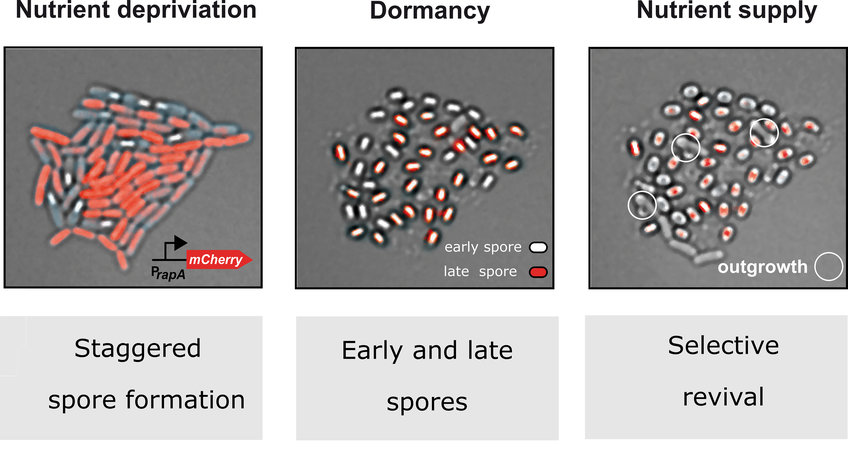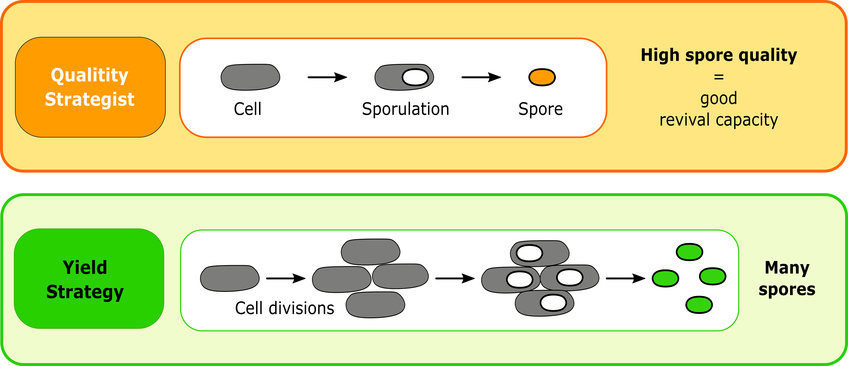Spore formation in fast motion
Time-lapse microscopy reveals different life cycle strategies in Bacillus subtilis

Like tiny space capsules, endospores protect the bacterial genome from heat, drought and starvation. When environmental conditions are suitable again, they revive within minutes and form a new cell that is capable of reproduction. Due to their high adaptability, bacterial endospores are omnipresent: as undesirable permanent guests in areas with high hygiene requirements, but also as highly biotechnologically useful target of industrial production, for example in probiotics for animal breeding and in biological plant protection.
Ilka Bischofs and her team from the Max Planck Institute for Terrestrial Microbiology and the University of Heidelberg are investigating the processes and signaling pathways that are involved in sporulation. Using time-lapse video techniques in combination with fluorescent markers, the team has succeeded for the first time in investigating both processes, sporulation and revival, in correlation - with surprising results and consequences.
Until now, it was apparently a coincidence whether or when a spore revives with new nutrients. However, by tracking the developmental history of the individual spores, the researchers discovered that the earlier a spore is formed, the faster it germinates and the more likely a new cell will grow out from the spore again.
This is due to the fact that cells under nutrient deficiency stop the production of a metabolic enzyme and thus existing enzymes have to be distributed to the offspring when spores are formed. Ilka Bischofs explains: "The less a cell has divided before the sporulation, the more enzyme is stored in the spore and the better the spore will gain momentum with new nutrients when waking up from dormancy - or put simply: who goes to sleep early, rises better".
More or better spores?

Spore formation as a multi-cellular phenomenon includes a trade-off: cell divisions before sporulation increase the total number of spores formed at the end. In contrast, rapid spore formation leads to a lower spore yield, but these spores have a better chance to revive with new nutrients and grow out new vegetative cells. This results in a tradeoff between spore yield and spore quality: i.e. spores can either make more or better spores.
Such quality-quantity trade-offs are widespread in nature, for example in the production of plant seeds and eggs from insects or fish. Depending on the environment, an increase in quantity or quality can be beneficial and lead to adaptation to different living conditions and habitats.
Which strategy wins depends on the environment
Life cycle assay of a yield strategist and a synthetic quality strategist
In nature, B. subtilis endospores can be found in both the soil and the intestines of soil-dwelling animals, for example chickens, and spores can also grow out in these habitats. Using time-lapse microscopy, the researchers showed that bacterial isolates employ different life cycle strategies: The soil isolate forms almost twice as many spores as the chicken isolate and therefore focuses on spore yield, whereas the chicken isolate focuses on "quality". When a number of additional signalling systems, that reduce the probability of sporulation in the soil isolate, were transferred into the genome of the chicken isolate, the latter became a yield strategist.
First experiments with a model system showed that this could reflect an adaptation to the habitat: By controlled expression of a sporulation kinase, the probability of sporulation could be adjusted to generate different life cycle strategies. Depending on the environmental conditions during spore revival either strategy could be advantageous. Lots of nutrients facilitated the outgrowth of all spores and thus spore yield beats spore quality. In contrast, in a nutrient poor environment that selects for outgrowth of high quality spores, the opposite applies.
From basic research to applications in organic farming
The trade-off between spore yield and quality may also be relevant for applied research. Already today spores play an important role in organic farming and are an integral part of biological plant protection products and probiotics. Bacillus uses nutrients available on the plant or in the animal to grow out cells from the spores and then produces natural biologically active substances that protect plants from fungi and promote animal health, respectively. Biotechnology companies therefore produce spores on a ton scale. For the production of spores in the bioreactor, the spore titer has so far been a decisive parameter. To what extent an optimization of the number of spores affects the quality of the spores is an important question in this context in order to improve the products and their effectiveness in the future.














